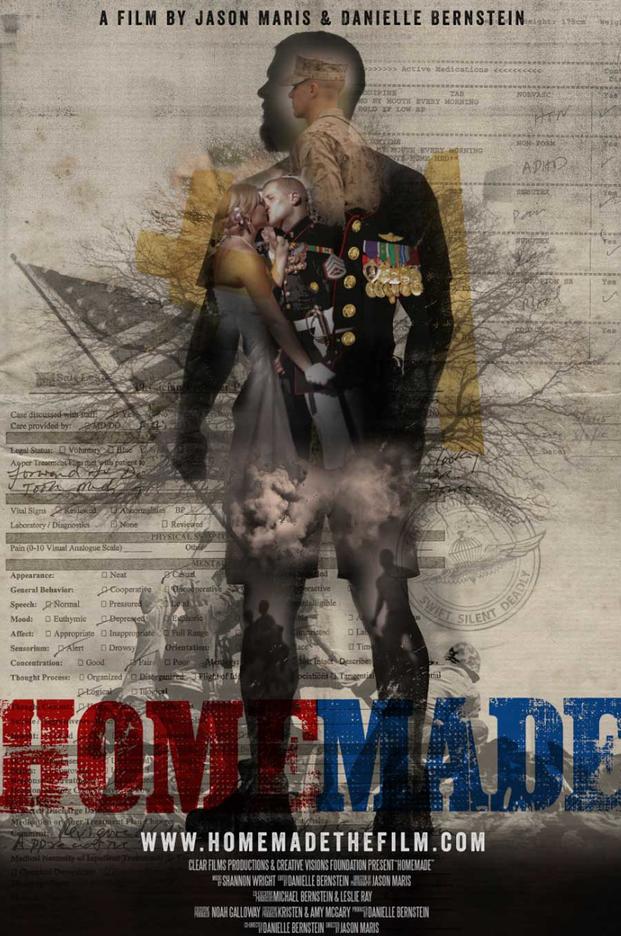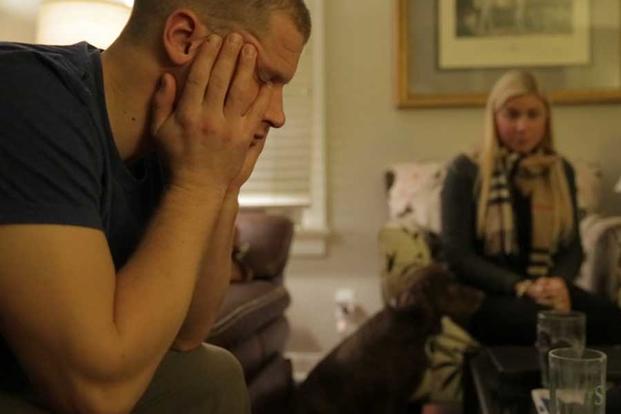Traumatic brain injury. Drug addiction. Three suicide attempts. Divorce. A prison sentence. For a Marine featured in a new documentary, returning from deployments to Iraq and Afghanistan was only the start of his fight for survival.
"Homemade," which was released in select movie theaters on Veterans Day and has more screenings expected, takes viewers on an intimate six-year journey through decorated Force Reconnaissance Marine Adam Sorensen's life following his time in combat.
Through interviews with Sorensen, his wife, his mother-in-law and his parents, the documentary paints a picture of the Marine's struggles with drug addiction, post-traumatic stress disorder and insomnia. The film at times shows raw moments between Sorensen and his frustrated wife as they talk about his drug addiction, and has graphic descriptions of his plans to end his life.
Sorensen said he let director Jason Maris continue filming the documentary even when the "negative things" began happening because he wanted to bring awareness to the problem.
Related: Commandant Responds to Troubling Study on Marine Corps Culture
In a panel discussion after a screening in Washington, D.C., on Nov. 12, Maris said that, while it's important for military families and caregivers to watch it, the documentary could also be a good tool for government and military leadership.
"Obviously, with this film, it isn't just to be entertainment, like a Hollywood flick," he said. "But I also think it's important to get it out to other people to just bring about the reality of these things -- these difficult things to watch and accept."
The film begins in May 2013 as Sorensen, then a staff sergeant, completes Officer Candidate School as the class honor graduate and goes to the University of Utah to become a second lieutenant through the commissioning program.

He laments early in the documentary that he never feels "awake or alive anymore," realizing as he meets fellow students that he had fought in a war that no one knows or even cares about.
Sorensen later admits he misses the life he had in the Marines and the value everything had during combat.
"Although difficult physically and mentally," he said, "I wouldn't mind if life had that much meaning all the time."
Over the next five years, Sorensen's struggles lead him to serve time in prison for violating a no-contact directive and be demoted to sergeant. He is eventually assigned to Wounded Warrior Battalion-West to recover and help him retire with his full benefits.
Maris said that, for him, the film's purpose is to show the "siloed" health care Sorensen received after leaving.
"Because what you see happening to the poster boy of the United States Marine Corps is he's just getting ramrodded through a homogenized system of care that doesn't work," he said during the D.C. panel discussion. "There's a lot of great things happening, but it's a continuity of care issue and everything is siloed."
Maris said that, since watching this film, Marine officials have identified a chain of command issue with officers ignoring the care Sorensen received for his traumatic brain injury and insomnia.
"We can really learn from this because this matches all of our data about high-performers crashing, and we see it," Maris said the Marine Corps leadership realized. "It's not just a number on a piece of paper now. We see it."
Maris is a freelance government contractor who often does recruitment videos for the Marine Corps. He said the original idea for the film was concentrated on two explosions: one in the field and one in the family living room, affecting loved ones, physicians and the community.
Since filming ended, Sorensen, 33, works as a wilderness guide in Moab, Utah. He said he still has issues, but it's an ongoing process and he is learning to be himself again instead of just being a Marine.
-- Dorothy Mills-Gregg can be reached at dorothy.mills-gregg@military.com.
Related: Navy Authorizes Two-Piece Swimsuits, Gold Star Lapel Button













